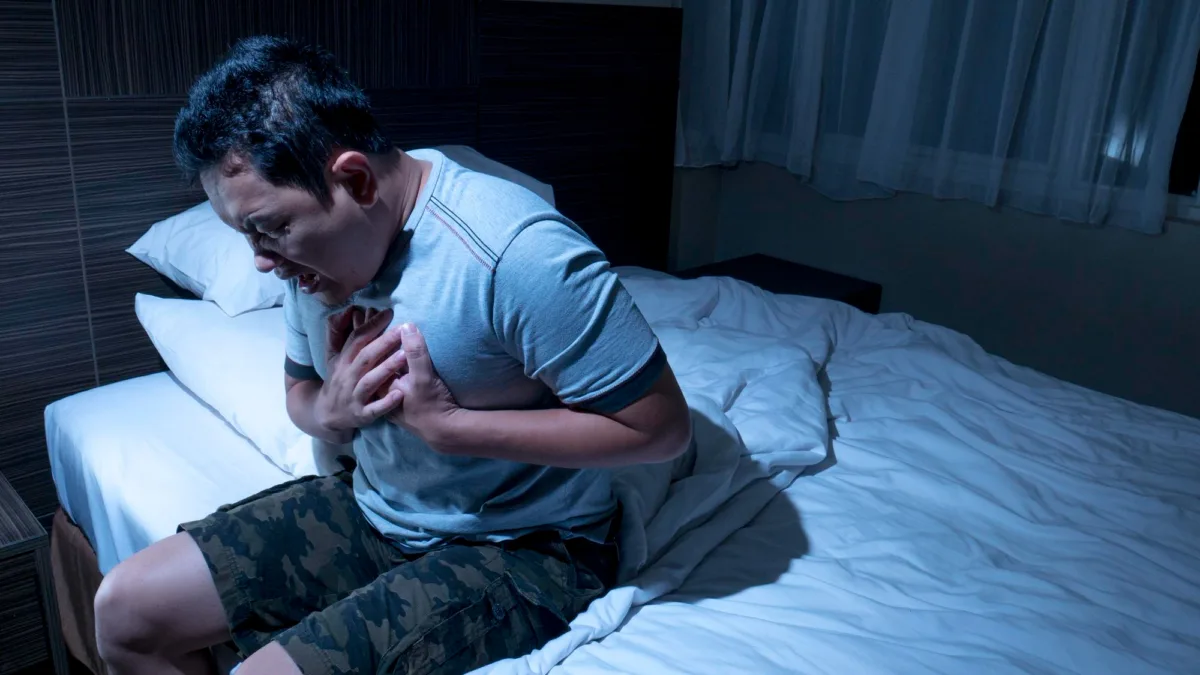Have you ever woken up suddenly in the middle of the night, heart pounding, short of breath, and convinced something is terribly wrong, even though everything seems fine around you?
It’s not just you.
We see this all the time at Shifa Al Khobar. People come to us after weeks or months of these episodes, unsure if it’s stress, a heart problem, or something they can’t even explain. What you’re likely experiencing is a nighttime panic attack. It’s a real thing. And while it can feel scary, it’s treatable.
Let’s break it down.
What Is a Nighttime Panic Attack?
It’s when your body suddenly goes into panic mode while you’re asleep or just falling asleep. There’s no clear danger, but your brain sends your body the same signals it would if you were being chased or in trouble.
You might feel:
- A racing heart
- Tightness in your chest
- Sweating
- Dizziness
- Feeling like you can’t breathe
- A deep fear that something terrible is happening
These attacks can last a few minutes, sometimes longer. And even after they pass, you’re left wide awake, anxious, and afraid it’ll happen again.
Why Does It Happen?
Here’s the thing: your body doesn’t always wait for your permission to react. Even if your mind seems calm, your nervous system might still be on high alert. That’s often what triggers panic at night.
Here are some common causes we see in our clinic:
1. Built-up stress
If you’ve been holding in tension all day, worrying about work, family, health, or money, your body might release that pressure when you’re finally at rest. Sometimes panic shows up when everything else is quiet.
2. Your body is overstimulated
Too much caffeine. Too little sleep. Constant phone use. No downtime. When your body doesn’t get a break, it can stay in a state of low-grade alertness. That makes it easier for panic to strike, especially at night.
3. There may be a physical trigger
We’ve had patients whose nighttime panic was linked to things like acid reflux, sleep apnea, low blood sugar, or even thyroid issues. These conditions can cause symptoms (like shortness of breath or chest tightness) that feel like panic and your brain reacts.
What You Can Do About It
You don’t have to live like this. At Shifa Al Khobar, we take this seriously. You deserve real help, not just advice to “calm down.”
Here’s what we often recommend:
Get a medical check-up
First, we rule out physical causes. A few simple tests can help us see if your body is under strain while you sleep. If something like low oxygen levels or reflux is behind the panic, we’ll treat that first.
Create a wind-down routine
We help patients build a quiet, predictable routine at night. No screens. Less caffeine. Soothing activities. Nothing fancy, just enough to tell your brain it’s time to relax.
Breathe through it, don’t fight it
If you wake up in panic, the instinct is to panic more. But try this instead: sit up slowly. Breathe in deeply through your nose for four seconds. Hold it for four. Breathe out slowly for six. Remind yourself: “This will pass. I am safe.” It won’t stop everything, but it gives your body a signal to calm down.
Therapy helps
Many people carry anxiety that hasn’t been addressed for years. Talking with a trained therapist helps you understand where the fear is coming from and how to take its power away.
You’re Not Alone in This
Nighttime panic attacks feel isolating. They often happen when no one else is awake. That can make you feel like something’s wrong with you, or that no one would understand.
But we understand. We’ve helped many people through this, and we’ll help you too.
Whether it’s your first attack or it’s been happening for years, we’ll listen. We’ll check what needs to be checked. And we’ll build a plan that works for you.
We’re here when you’re ready to talk. And we’ll take it from there. Contact us to book an appointment.

